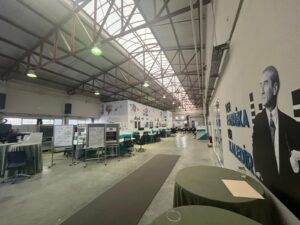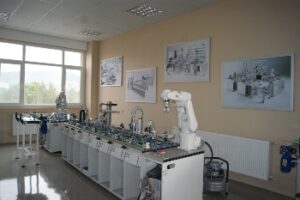By Dr. Serdal Temel, Associate Professor Innovation and Entrepreneurship and Dr. Hulya Yılmaz Temel, Lecturer, Ege University
 Deep tech entrepreneurship is at the forefront of transforming scientific research into disruptive technologies that address complex global challenges. Universities, research centres, and science parks in the Aegean Region of Turkey are fostering an environment conducive to deep tech innovation. This article explores how the Aegean Region supports deep tech entrepreneurship and highlights key activities essential for nurturing this ecosystem.
Deep tech entrepreneurship is at the forefront of transforming scientific research into disruptive technologies that address complex global challenges. Universities, research centres, and science parks in the Aegean Region of Turkey are fostering an environment conducive to deep tech innovation. This article explores how the Aegean Region supports deep tech entrepreneurship and highlights key activities essential for nurturing this ecosystem.
Cultivating an Innovation-Friendly Environment
The Aegean Region has recognised the potential of deep tech to transform industries such as healthcare, biotechnology, medical technology, and renewable energy. To cultivate an innovation-friendly environment, universities and research centres in the region have established dedicated research centres and laboratories focusing on cutting-edge technologies. These facilities provide researchers and students with the resources and infrastructure needed to experiment, prototype, and develop novel solutions. However, these organisations are still developing and primarily focusing on expanding their knowledge base for deep tech entrepreneurship.
Incubation and Acceleration Programs
One of the key activities in the region is the implementation of incubation and acceleration programs. These programs are designed to support startups in their early stages by providing mentorship, funding opportunities, and access to industry networks. Ege University Science Park, Izmir Science Park, Dokuz Eylul University Science Park, and İzmir Bilimpark collaborate closely, serving as hubs for deep tech startups. These facilities offer collaborative spaces where entrepreneurs can refine their ideas and bring them to market. Through these programs, startups receive tailored support that accelerates their growth and increases their chances of success.
Cross-Disciplinary Collaboration
Deep tech often requires the convergence of multiple scientific disciplines. At the universities in the region, nurturing cross-disciplinary collaboration is a priority. Researchers from diverse fields such as engineering, life sciences, agriculture, food, energy, environmental science, and IT work together on projects that combine their expertise to tackle complex problems. This collaborative approach enhances the quality of research and leads to the creation of more innovative and robust solutions in the region.
Industry Partnerships and Technology Transfer
Strong industry partnerships are essential for the successful commercialisation of deep tech innovations. Universities are engaging with industrial partners to ensure that research outcomes align with market needs, though there is room for improvement. The universities’ technology transfer offices play critical roles in this process by identifying marketable technologies, securing intellectual property rights, and facilitating licensing agreements. These efforts bridge the gap between academia and industry, enabling research breakthroughs to be transformed into viable commercial products. However, the commercialisation of deep tech inventions faces various challenges in the region, necessitating improvements in IP management and commercialisation capacities.
Funding and Investment
Access to funding is a significant challenge for deep tech startups due to the high risk and long development timelines associated with these ventures. Universities, science parks, and incubation centres collaborate with government bodies, venture capital firms, and angel investors to create funding opportunities for deep tech entrepreneurs. Grants, seed funding, and venture capital investments are available to support the development and scaling of innovative technologies. Additionally, ecosystem partners organise pitch events and competitions where startups can showcase their ideas to potential investors.

Educational Programs and Workshops
Education and continuous learning are fundamental to grow a deep tech ecosystem. Most universities in the region offer educational programs and workshops that equip students and researchers with the skills needed to succeed in deep tech entrepreneurship. These programs cover a wide range of topics, including technology commercialisation, intellectual property management, and business development. By providing practical training and real-world insights, the universities prepare the next generation of entrepreneurs to lead the way in deep tech innovation. However, these programs are relatively new and need to mature to provide tangible results in the region.
The Aegean Region’s commitment to deep tech entrepreneurship is evident through its comprehensive support system that spans research, incubation, collaboration, and commercialisation. By creating an environment that encourages innovation and providing the necessary resources and support, universities and science parks play pivotal roles in driving technological advancements and shaping the future of various industries. The efforts of ecosystem stakeholders benefit the academic community and contribute significantly to the broader economic and technological landscape.
